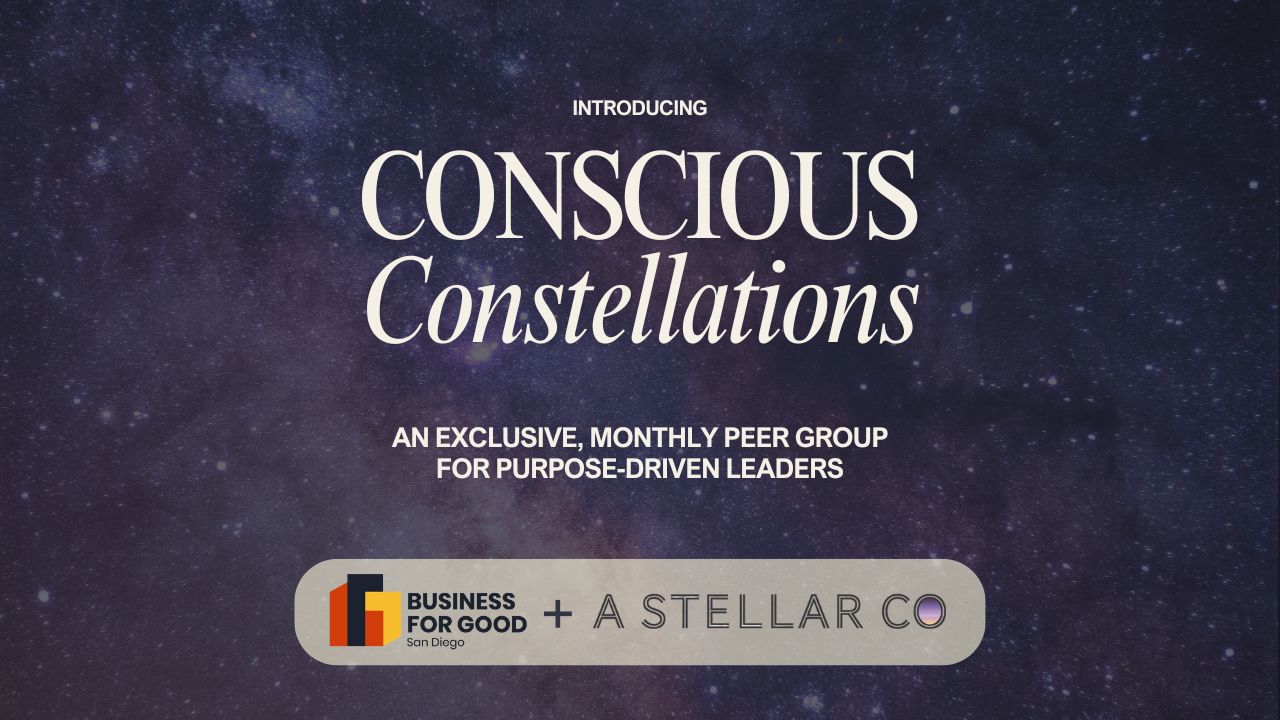The Best PR Tips for Small Businesses

Almost every small business owner has a vague idea that doing some kind of marketing, communications, public relations (PR), or advertising for their business is important. But what do any of those words mean? More importantly, how can a small business get the word out about themselves without spending a fortune?
Fortunately, Jean Walcher, a Business For Good member and founder of J. Walcher Communications in San Diego, has your back. J. Walcher Communications is a PR and marketing agency dedicated to helping companies large and small grow their businesses and give their brands bigger voices.
Jean, who grew up in San Diego, founded J. Walcher Communications in 2001, after spending many years working in PR in New York and in the film industry in Los Angeles.
“As it says on our website, what we do is more than just press releases and who you know. PR and marketing must be strategic, thoughtful, persistent, and innovative,” says Jean. “This is what we know, what we love, and, quite frankly, what we’re good at.”
Here, Jean explains why she started her business, the challenges small business owners in San Diego face when they’re trying to talk about themselves, and what it really means to do good PR.
Know the difference between PR and marketing
We know, it’s confusing. Many of you may have heard these words used interchangeably throughout your careers. But knowing what each term means and what each type of professional does is important–and it’ll help you ask for the communications help you need.
“Marketing is the umbrella term for everything you do to get the word out about what you’re doing to the people you want to reach,” says Jean “Under the general category of marketing, we have PR, which stands for public relations. Advertising is another area under the marketing category, but many PR agencies, like ours, are more full-service these days, offering advertising and other services under that umbrella.”
Per Jean, advertising is pretty straightforward: you identify where you want to get your message out in front of potential audiences or customers, such as a TV commercial or social media ad, write it, design it, and pay for it to get sent out. PR, on the other hand, is more nuanced and relationship-based.
In other words, those people you see being interviewed on the local news, getting viral attention on social media, or speaking at high-profile conferences didn’t just get there by accident. PR is:
- A vital part of any marketing strategy
- About getting third-party endorsements from trusted journalists, influencers, publications, or organizations, which makes you and your business look more credible
- Less a direct sales call and more of a steady, long-term brand-building exercise
- Done in a number of ways, including media relations; social media strategy; securing speaking opportunities; and submitting you for meaningful awards. “Think about it,” Jean says. “Which do you trust more, a business mentioned in a newspaper article on a topic important to you or a business you saw an ad for?”
Your website and social media platforms are your foundation
As the saying goes, “you have to spend money to make money.” Outside PR and marketing support is a foundational investment for any business.
However, if you are just starting out and truly do not have any budget for PR and marketing, make sure your website and your social media profiles are up to speed.
“You have to have a good, solid website that states succinctly what your business does, contains your contact information, and has a way to collect visitors’ names and addresses, in case you’d like to communicate with them again,” says Jean. “Pay a professional to create it, because this is the first, most important thing you can do to build up your customer base. Don’t rely on your Facebook or Yelp page!”
Jean has some specific tips for setting up your social media accounts, as well:
- Don’t do more than you can manage
- Pick two social media platforms that you know you can be active on, and that you know will be used by the people who are your target customers. For example, if you’re a consumer brand selling beauty products, you may not want to pour all your energy into LinkedIn at the expense of more visual platforms like Instagram and TikTok
- It’s better to do a few well than do all of them poorly
If you can’t afford to hire someone for PR, try to build relationships with local media
Getting mentioned in a news article or interviewed by a local radio or TV show is a great way to reach the people immediately watching or reading. But longer-term, it’s good for your SEO, boosting your company in search engine results.
Jean cautions that building relationships with the right media contacts is time-consuming. It’s what PR professionals tackle so their clients can focus on building their businesses and doing what they do best.
But if you’re on a shoestring budget, try your best to build relationships with local reporters and news producers.
“Think about the stories you and others in your business read or follow the most,” says Jean. “What newspapers, online magazines, TV, or radio shows did those stories run on? Who wrote or produced them? These reporters and producers are always looking for interesting stories. Reach out to those people and introduce yourself. Email them with updates about what you’re doing and try to cultivate a relationship, especially if you’re doing something unique.”
Use generative AI with caution
It may be tempting to assume that you can have ChatGPT, Gemini, or any other generative AI platform just write all of your marketing copy, press releases, newsletters, social media posts, and emails for you, especially if you’re tight on time and funds.
But remember, AI is just one tool in the communications toolbox—and a human will still ultimately do a better job at communicating and building relationships with other influencers for you.
“It’s a great way to start and potentially get a base of work going, but you always have to put in the time to finesse whatever the AI comes up with, making it accurate to you and specific to your audience,” says Jean. “That can often take more time than you think.”
PR professionals are your greatest ally when it comes to telling your story to the world
Even if you do have experience in marketing or public relations, it’s incredibly hard to do it well for yourself when you’re also trying to run a business.
Hiring someone to do your PR, whether it’s an employee or outside agency, is a much more efficient use of your resources. Good PR often takes time, because it’s so strategic and takes perseverance and creativity. But if your PR professional knows what they’re doing, you will see results.
“We know how to speak to customers, and we manage that so you can devote your attention to running your business,” says Jean. “Story-telling is such a core component of what we do, and we’re able to strategize how and when to tell yours effectively.”
When asked what she loves about the PR business, Jean’s reply was simple but powerful:
“The variety. There’s never a dull moment. It’s a complex business–exciting, challenging, stressful. It’s much less glamorous than it seems on TV. But it allows me to learn things I never thought I’d know about, and that’s cool.”
